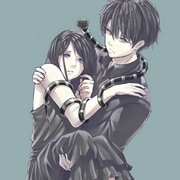He approached the open clearing, the city eerily silent in the dead of the night. Soon he heard Gita’s voice up ahead, the clear sounds of a sword flashing through the air. He made to go toward her, but stopped when he heard a second voice, this one totally unfamiliar to him. He frowned to himself, ducking behind one of the barracks to hide. Who was she talking to this late?
“Better,” Gita said. “Another ten swings. Be sure to keep your arms bent.”
Thinking he was sufficiently hidden by the cover of darkness, Esfandar peeked around the edge of the building. He caught sight of Gita not far off in the distance, her arms crossed and her expression serious as she oversaw a young recruit go through drills before her. The prickly feeling in Esfandar’s stomach dissipated when he saw it was just a boy, by the looks of it one hardly even old enough to be a soldier. His body was small and scrawny, and his face was still as smooth and soft as a child’s. His brow furrowed, sweat dripping down his forehead, as he painstakingly repeated the same sword motion over and over again. His form wasn’t bad, but the weight of the sword was clearly too much for him. His arms trembled ever so slightly. By the end of the drill he leaned over onto his knees, gasping for breath.
Gita clearly noticed the same thing. “That’s enough for today,” she said, putting a hand on his shoulder. She let a small smile grace her features. “You’ve done well. I’m proud of you.”
The boy looked up at her with stars shining in his eyes. Immediately, he dropped to his knees before her and pressed his forehead to the ground, a gesture of gratitude and respect.
“I can never express to you in words how grateful I am,” he said, his voice trembling with emotion. “There was no one else I could trust, no one else who understood. I was so, so afraid… I don’t know what would have happened to me if you hadn’t agreed to train me.”
Gita gently touched the boy’s shoulder and gestured for him to stand again. She looked at him with a soft gaze, a sort of fondness in her eyes that Esfandar had rarely seen.
“I have something for you,” Gita announced. She reached into a pocket and withdrew worn piece of twine threaded with bright red clay beads. Esfandar recognized it- it was one of the bracelets Gita always wore, that she never ever took off. They held a deep meaning for her, Esfandar knew, though what exactly that meaning was she had never revealed to him.
And now Gita took the bracelet and tied around the young boy’s wrist. The boy stared at the bracelet as she affixed it to him then turned his wide-eyed gaze back to her.
“But this is yours…”
“It is a ritual gift in my tribe,” Gita told him. “I received it when I earned the strength and fortitude symbolized by these beads. Now you have earned it. It’s yours.”
Esfandar felt a sharp pang in his chest, one he wished he could make disappear. Gita had never even told him the meaning behind her bracelets, never explained their origin, but she so easily gave one away to this child. Did she really not think Esfandar worthy of telling? The idea that she thought so little of him made him wince.
The young boy’s eyes were still wide, but he silently nodded, accepting the gift. Gita’s affectionate smile widened.
“Now go,” she said, “Before someone finds you out of the barracks.”
Her reminder jolted the boy back into action. He nodded firmly once, bowing to Gita one more time, before turning to run back to bed. The sound of his feet hitting the ground faded away until the night was silent once more. Esfandar watched as Gita looked in the direction the boy had gone for a minute longer before turning away.
Esfandar thought over what he had just seen. How had he not been aware that Gita was training young, weak recruits on her own? She already had so many duties as lieutenant, with her own forces and men to train and command. Esfandar shook his head in wonder. He didn’t understand how one person could do so much and without a single complaint or plea for help.
He held back a sigh. He really should reveal himself to her- he’d been eavesdropping long enough. He hadn’t even taken a single step out into the open, however, when Gita’s voice drifted over to him.
“Enjoying the show?” she asked, her tone knowing. She had sat down on a bench to begin sharpening her daggers, her gaze not even looking in his direction. Esfandar tensed for a moment before sighing and walking toward her. There was no point in hiding it.
“I didn’t mean to spy,” he said. She still didn’t take her attention away from her knives as he approached, so he took the seat next to her on the bench. “I thought the boy would be scared out of his wits if I suddenly interrupted your training session.”
She paused in sharpening her dagger to turn and arch a brow at him. A small smile quirked up her lips, as if she found something funny.
Esfandar frowned. “What?” He straightened his shoulders. “Did I say something wrong?”
She shook her head and turned back to her task without answering him. The small smile stayed on her face.
“How was the banquet?”
Esfandar stayed silent for a minute, his brow creasing as he searched for an appropriate reply.
“The men are happy,” he said at last. “Too happy. They don’t see how precarious our position is?”
The metallic screech of rock against metal grated against Esfandar’s ears, but Gita didn’t seem to mind the sound as she finished with one knife and moved on to the next.
“Isn’t it good for them to have one night to celebrate?” she asked. “They just conquered a city. Recognizing their triumph will boast morale.”
“And that’s why we held the banquet, as Karim insisted,” Esfandar replied. “But that doesn’t mean I have to enjoy it.” It was his turn to arch a brow. “And why weren’t you at the banquet, then, if you think it’s so good for morale?”
“You know I don’t like events with so many people.”
“Says the woman in charge of 10,000 soldiers.”
She rolled her eyes. “You know what I mean. I’d rather charge into battle than attend a banquet any day.”
Esfandar let out a short laugh. “Well, we agree on that at least.” He glanced toward her, but her back was still facing him as she worked. The multiple bracelets on her arms moved and clattered together, reminding him that one bracelet was now missing.
“How long have you been training inexperienced recruits?” he asked.
The question didn’t faze her. “A few months.”
“You should have told me if they needed more training,” he said, frustrated. “I could have told Babak to arrange extra lessons for them. You already have too many responsibilities on your shoulders without adding taking care of young soldiers to the list. Why didn’t you tell me?”
Gita put down her daggers and turned to face him, her braid whipping out behind her with the movement. Her gaze was firm, undeterred. “I don’t trust Babak to oversee their training.”
“I know you don’t like him, but he’s a skilled general. He’s good at turning boys into soldiers,” Esfandar argued. “The boy you were training just now had good form. I’m sure if he-“
“That was not a boy,” Gita interrupted him. “The young recruit you saw me training was a girl, and there are many others like her in this army.”
Esfandar opened his mouth to speak and then shut it. Things suddenly started to fit into place in his head now. He recalled the boy he’d seen, how thin and baby-faced he’d been, his voice and mannerisms. Gods, he was stupid.
Gita went on. “They’re very capable soldiers, but they’re terrified of being discovered and thrown out. They came to me asking for training, and I accepted.”
Esfandar broke her strong gaze, rethinking the situation. Officially, there was no law against women joining the Parthian army. Reality, however, was much different. Women of all houses and backgrounds were typically married off before they had a chance to think of becoming soldiers, and the few who did were mercilessly harassed by their fellow soldiers if they were discovered. There were always outstanding exceptions, of course. Gita, who came from a tribe where women were warriors the same as men, had earned the begrudging respect of his soldiers. The same had been true for Parvana, who had followed in the footsteps of her father, Nouren Pahlavi, one of the greatest generals to ever live. Parthian folklore spoke lovingly of heroes like Yima, the woman who led Parthia to victory in the Second Turani War. But not all women could be heroes, and those who weren’t suffered for it. Changing that reality wouldn’t happen overnight.
“How many are there?” Esfandar asked her.
“Perhaps one hundred, maybe less. All younger than twenty years old.”
“The youngest?”
“You just saw her,” Gita replied. “Sahi is Fifteen.”
Fifteen. So young, and she looked even younger. Esfandar wondered what had driven the girl to take the risk in becoming a soldier. He couldn’t imagine the courage and dedication it must have taken. He looked back toward Gita. Her gaze didn’t leave his, waiting in silence for an answer.
“You know them better than I do. I trust your advice on this matter,” he said. “Is there anything we can do to help them?”
Gita shook her head. “Not now. Not while they are still fresh and inexperienced. But in a couple of years, once they have proven themselves in battle- promote them. Give them the reward and recognition they are due. Maybe one day, when the troops look up and realize that all of the generals leading them are women- maybe on that day, we can begin to make real changes.”
Esfandar nodded in agreement, but his heart still felt heavy. His chest was heavy with guilty for not thinking of the young girl soldiers before, for being so oblivious to their hardships. How on earth was he supposed to be the ruler of a nation if he couldn’t even remember the most vulnerable of his subjects? It was shameful. He prayed Gita at least would always be there to help him see clearly, to guide him down the right path. Somehow, she always knew what was right.
“Get up.” Gita’s voice interrupted his spiraling thoughts. She had stood up, and wielded two daggers in her hands, her body prepared in a fighting stance. Her eyes glinted in the moonlight. “It’s been too long since we’ve sparred. You haven’t gotten weaker, have you?”
Esfandar smiled at the familiar challenge, standing up and drawing his own blade. She was right- now was not the time to wallow in remorse and misery. He needed to distract himself from it, and training was his preferred method.
He inhaled once to calm himself. Then he lunged forward to attack.











Comments (0)
See all